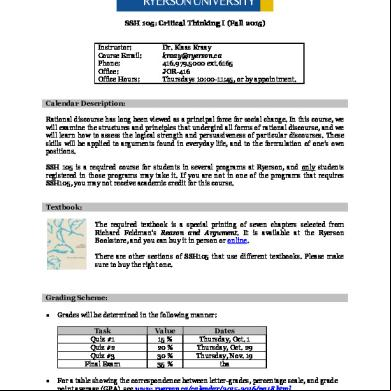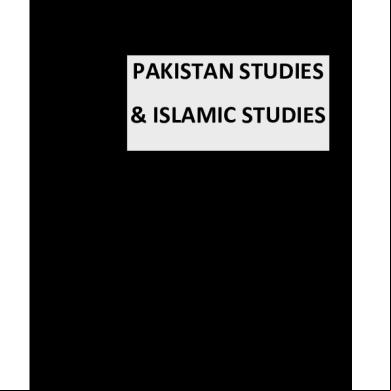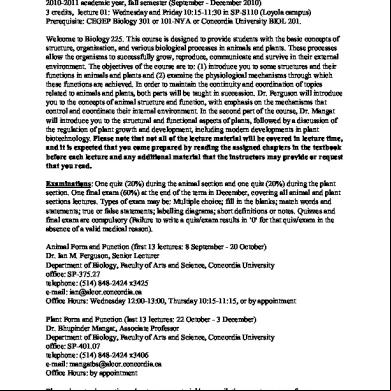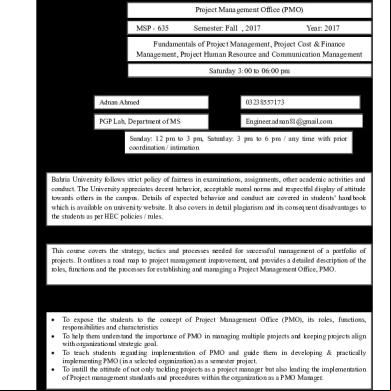Ssh 105 Course Outline Fall 2015 4m8c
This document was ed by and they confirmed that they have the permission to share it. If you are author or own the copyright of this book, please report to us by using this report form. Report 3b7i
Overview 3e4r5l
& View Ssh 105 Course Outline Fall 2015 as PDF for free.
More details w3441
- Words: 1,288
- Pages: 4
SSH 105: Critical Thinking I (Fall 2015) Instructor: Course Email: Phone: Office: Office Hours:
Dr. Klaas Kraay [email protected] 416.979.5000 ext.6165 JOR-416 Thursdays 10:00-11:45, or by appointment.
Calendar Description: Rational discourse has long been viewed as a principal force for social change. In this course, we will examine the structures and principles that undergird all forms of rational discourse, and we will learn how to assess the logical strength and persuasiveness of particular discourses. These skills will be applied to arguments found in everyday life, and to the formulation of one’s own positions. SSH 105 is a required course for students in several programs at Ryerson, and only students ed in those programs may take it. If you are not in one of the programs that requires SSH105, you may not receive academic credit for this course. Textbook: The required textbook is a special printing of seven chapters selected from Richard Feldman’s Reason and Argument. It is available at the Ryerson Bookstore, and you can buy it in person or online. There are other sections of SSH105 that use different textbooks. Please make sure to buy the right one.
Grading Scheme:
Grades will be determined in the following manner: Task Quiz #1 Quiz #2 Quiz #3 Final Exam
Value 15 % 20 % 30 % 35 %
Dates Thursday, Oct. 1 Thursday, Oct. 29 Thursday, Nov. 19 tba
For a table showing the correspondence between letter-grades, percentage scale, and grade point average (GPA), see www.ryerson.ca/calendar/2015-2016/pg18.html.
Course Meeting Times for SSH 105:
The two-hour class period on Thursdays will be used for lectures, discussion, and for the three scheduled quizzes.
Each student is assigned to one tutorial group, which meets for one hour each week. (Your class schedule will tell you when and where your group meets.) This session will be used for review and practice of course material.
-
Attendance in your tutorial is mandatory. Attendance will be taken every week, and 1% will be deducted from your final grade for each illegitimate absence.
-
It is not possible to switch tutorial groups informally: any switching must be done by officially changing sections at my.ryerson.ca, and the last date to do this is Friday, September 18th.
Your TA will hold one office hour per week, and you will be informed of the time and location. Prof. Kraay’s office hours will be held on Thursdays from 10:00-11:45 in JOR-416, or by appointment. You are all encouraged to visit these office hours at any time during the semester if you have questions, comments, concerns, or suggestions about any aspect of SSH 105.
ed Learning Groups ed Learning Groups (SLGs) are free study and review sessions available for all students enrolled in SSH105. They are led by peer leaders. These sessions are an opportunity to work through the course content at your own pace, to practice problems, and to learn study strategies. All sessions will be held on the 4th floor of the Student Learning Centre. The full schedule and locations will be posted to the course shell in early September. Course Policies for SSH 105: Email
You are welcome to email me at [email protected] if necessary, but please understand that I am teaching 800 students this semester, and so it is not possible for me to have lengthy discussions about course content over email. If you need individual assistance in SSH105, you should come to my office hours or your TA’s office hours.
You must use your Ryerson email to email me.
Here is some useful useful advice on how to draft a professional email.
Use of Electronic Devices in Class The use of electronics, including laptops and cell phones, will not be permitted in this class unless the student can provide a legitimate argument for why he or she needs to use such a device, and the instructor has given written permission for such an exception. Detailed reasons for this policy will be given during the first lecture.
2
Alternate Arrangements
Students are required to inform their instructors of any situation which may have an adverse effect upon their academic performance, and must request any accommodations according to the relevant policies and well in advance. Failure to do so will jeopardize any academic appeals.
Students shall inform their instructor, in advance, when they will miss an exam, test or assignment deadline. When circumstances do not permit this (e.g. in an emergency) the student must inform the instructor as soon as possible. Alternate arrangements may include the setting of a make-up test, transferring the weight of a missed assignment to the final examination or extending a deadline. Ryerson University’s complete policy concerning alternate arrangements for medical and comionate reasons may be found at www.ryerson.ca/content/dam/senate/policies/pol134.pdf. Medical Considerations: In order for alternate arrangements to be made on medical grounds, a student must provide, within three working days, (1) a Ryerson Medical Certificate and (2) an Academic Consideration Form. Both documents must be submitted to the student’s program department. They can be found here: www.ryerson.ca/senate/forms/medical.pdf. Religious Observance: If a student needs accommodation due to religious observance, he or she must submit (1) a Request for Accommodation of Student Religious, Aboriginal and Spiritual Observance Form and (2) an Academic Consideration Form, within the first two weeks of classes, or, for a final examination, within two weeks of the posting of the examination schedule. If the required absence occurs within the first two weeks of classes, or the dates are not known well in advance as they are linked to other conditions, these forms should be submitted with as much lead time as possible in advance of the required absence. Forms must be submitted to the student’s program department. They can be found here: www.ryerson.ca/senate/forms/relobservforminstr.pdf. Comionate Considerations: In order for alternate arrangements to be made on comionate grounds, the student must deliver, within three working days, an Academic Consideration Form, along with appropriate documentation (if necessary), to the student’s program department. This form can be found here: www.ryerson.ca/content/dam/senate/forms/academic_consideration_document_submis sion.pdf.
Alternate arrangements will only be made on the basis of circumstances that are both (1) legitimate and (2) unforeseeable. Some examples of circumstances that typically fail to meet one or both of these conditions are: extra-curricular activities, employment obligations, multiple deadlines, and computer malfunctions.
Student Codes of Conduct
For detailed information concerning academic misconduct and the relevant penalties, see Ryerson’s Student Code of Academic Conduct: www.ryerson.ca/senate/policies/pol60.pdf. See also Ryerson’s Academic Integrity Website: www.ryerson.ca/academicintegrity/.
Ryerson University’s Student Code of Non-Academic Conduct covers, among other offences, disruption of learning and teaching. This includes the disruptive use of electronic equipment. For more information, see: www.ryerson.ca/studentcode/#conduct.
3
Course Schedule for SSH 105:
Week 1
Lecture Date Sept. 10th
Provisional Topic and Required Reading
Other
Feldman, Chapter 1: “Introduction”
2
Sept. 17th
Feldman, Chapter 2: “Truth and Rationality”
3
Sept. 24th
Feldman, Chapter 3: “Well-Formed Arguments”
4
Oct. 1st
5
Oct. 8th
Sept. 18th: final date to add/swap courses and sections.
Quiz #1 (15%) Feldman, Chapter 4: “Strong Arguments”
Oct. 12-16: Fall Reading Week (NO CLASSES) 6
Oct. 22nd
7
Oct. 29th
8
Nov. 5th 12th
Feldman, Chapter 5: “Reconstructing Arguments”
Answers to Quiz #1 during this week’s tutorials.
Quiz #2 (20%) Feldman, Chapter 6: “Details of Argument Reconstruction” Feldman, Chapter 7: “Evaluating Arguments”
9
Nov.
10
Nov. 19th
11
Nov. 26th
More on Evaluating Arguments; Fallacies
12
Dec. 3rd
Remaining material and Course Review
Quiz #3 (30%)
December 8th-19th: Final Exam Period See: www.ryerson.ca/currentstudents/academics/exams/.
Answers to Quiz #2 during this week’s tutorials. Nov. 20th: final date to drop a course.
Answers to Quiz #3 during this week’s tutorials. Final Exam (3 hours; 35%)
Faculty/Course Surveys will be istered during weeks 9 through 12. Details to follow.
4
Dr. Klaas Kraay [email protected] 416.979.5000 ext.6165 JOR-416 Thursdays 10:00-11:45, or by appointment.
Calendar Description: Rational discourse has long been viewed as a principal force for social change. In this course, we will examine the structures and principles that undergird all forms of rational discourse, and we will learn how to assess the logical strength and persuasiveness of particular discourses. These skills will be applied to arguments found in everyday life, and to the formulation of one’s own positions. SSH 105 is a required course for students in several programs at Ryerson, and only students ed in those programs may take it. If you are not in one of the programs that requires SSH105, you may not receive academic credit for this course. Textbook: The required textbook is a special printing of seven chapters selected from Richard Feldman’s Reason and Argument. It is available at the Ryerson Bookstore, and you can buy it in person or online. There are other sections of SSH105 that use different textbooks. Please make sure to buy the right one.
Grading Scheme:
Grades will be determined in the following manner: Task Quiz #1 Quiz #2 Quiz #3 Final Exam
Value 15 % 20 % 30 % 35 %
Dates Thursday, Oct. 1 Thursday, Oct. 29 Thursday, Nov. 19 tba
For a table showing the correspondence between letter-grades, percentage scale, and grade point average (GPA), see www.ryerson.ca/calendar/2015-2016/pg18.html.
Course Meeting Times for SSH 105:
The two-hour class period on Thursdays will be used for lectures, discussion, and for the three scheduled quizzes.
Each student is assigned to one tutorial group, which meets for one hour each week. (Your class schedule will tell you when and where your group meets.) This session will be used for review and practice of course material.
-
Attendance in your tutorial is mandatory. Attendance will be taken every week, and 1% will be deducted from your final grade for each illegitimate absence.
-
It is not possible to switch tutorial groups informally: any switching must be done by officially changing sections at my.ryerson.ca, and the last date to do this is Friday, September 18th.
Your TA will hold one office hour per week, and you will be informed of the time and location. Prof. Kraay’s office hours will be held on Thursdays from 10:00-11:45 in JOR-416, or by appointment. You are all encouraged to visit these office hours at any time during the semester if you have questions, comments, concerns, or suggestions about any aspect of SSH 105.
ed Learning Groups ed Learning Groups (SLGs) are free study and review sessions available for all students enrolled in SSH105. They are led by peer leaders. These sessions are an opportunity to work through the course content at your own pace, to practice problems, and to learn study strategies. All sessions will be held on the 4th floor of the Student Learning Centre. The full schedule and locations will be posted to the course shell in early September. Course Policies for SSH 105: Email
You are welcome to email me at [email protected] if necessary, but please understand that I am teaching 800 students this semester, and so it is not possible for me to have lengthy discussions about course content over email. If you need individual assistance in SSH105, you should come to my office hours or your TA’s office hours.
You must use your Ryerson email to email me.
Here is some useful useful advice on how to draft a professional email.
Use of Electronic Devices in Class The use of electronics, including laptops and cell phones, will not be permitted in this class unless the student can provide a legitimate argument for why he or she needs to use such a device, and the instructor has given written permission for such an exception. Detailed reasons for this policy will be given during the first lecture.
2
Alternate Arrangements
Students are required to inform their instructors of any situation which may have an adverse effect upon their academic performance, and must request any accommodations according to the relevant policies and well in advance. Failure to do so will jeopardize any academic appeals.
Students shall inform their instructor, in advance, when they will miss an exam, test or assignment deadline. When circumstances do not permit this (e.g. in an emergency) the student must inform the instructor as soon as possible. Alternate arrangements may include the setting of a make-up test, transferring the weight of a missed assignment to the final examination or extending a deadline. Ryerson University’s complete policy concerning alternate arrangements for medical and comionate reasons may be found at www.ryerson.ca/content/dam/senate/policies/pol134.pdf. Medical Considerations: In order for alternate arrangements to be made on medical grounds, a student must provide, within three working days, (1) a Ryerson Medical Certificate and (2) an Academic Consideration Form. Both documents must be submitted to the student’s program department. They can be found here: www.ryerson.ca/senate/forms/medical.pdf. Religious Observance: If a student needs accommodation due to religious observance, he or she must submit (1) a Request for Accommodation of Student Religious, Aboriginal and Spiritual Observance Form and (2) an Academic Consideration Form, within the first two weeks of classes, or, for a final examination, within two weeks of the posting of the examination schedule. If the required absence occurs within the first two weeks of classes, or the dates are not known well in advance as they are linked to other conditions, these forms should be submitted with as much lead time as possible in advance of the required absence. Forms must be submitted to the student’s program department. They can be found here: www.ryerson.ca/senate/forms/relobservforminstr.pdf. Comionate Considerations: In order for alternate arrangements to be made on comionate grounds, the student must deliver, within three working days, an Academic Consideration Form, along with appropriate documentation (if necessary), to the student’s program department. This form can be found here: www.ryerson.ca/content/dam/senate/forms/academic_consideration_document_submis sion.pdf.
Alternate arrangements will only be made on the basis of circumstances that are both (1) legitimate and (2) unforeseeable. Some examples of circumstances that typically fail to meet one or both of these conditions are: extra-curricular activities, employment obligations, multiple deadlines, and computer malfunctions.
Student Codes of Conduct
For detailed information concerning academic misconduct and the relevant penalties, see Ryerson’s Student Code of Academic Conduct: www.ryerson.ca/senate/policies/pol60.pdf. See also Ryerson’s Academic Integrity Website: www.ryerson.ca/academicintegrity/.
Ryerson University’s Student Code of Non-Academic Conduct covers, among other offences, disruption of learning and teaching. This includes the disruptive use of electronic equipment. For more information, see: www.ryerson.ca/studentcode/#conduct.
3
Course Schedule for SSH 105:
Week 1
Lecture Date Sept. 10th
Provisional Topic and Required Reading
Other
Feldman, Chapter 1: “Introduction”
2
Sept. 17th
Feldman, Chapter 2: “Truth and Rationality”
3
Sept. 24th
Feldman, Chapter 3: “Well-Formed Arguments”
4
Oct. 1st
5
Oct. 8th
Sept. 18th: final date to add/swap courses and sections.
Quiz #1 (15%) Feldman, Chapter 4: “Strong Arguments”
Oct. 12-16: Fall Reading Week (NO CLASSES) 6
Oct. 22nd
7
Oct. 29th
8
Nov. 5th 12th
Feldman, Chapter 5: “Reconstructing Arguments”
Answers to Quiz #1 during this week’s tutorials.
Quiz #2 (20%) Feldman, Chapter 6: “Details of Argument Reconstruction” Feldman, Chapter 7: “Evaluating Arguments”
9
Nov.
10
Nov. 19th
11
Nov. 26th
More on Evaluating Arguments; Fallacies
12
Dec. 3rd
Remaining material and Course Review
Quiz #3 (30%)
December 8th-19th: Final Exam Period See: www.ryerson.ca/currentstudents/academics/exams/.
Answers to Quiz #2 during this week’s tutorials. Nov. 20th: final date to drop a course.
Answers to Quiz #3 during this week’s tutorials. Final Exam (3 hours; 35%)
Faculty/Course Surveys will be istered during weeks 9 through 12. Details to follow.
4










